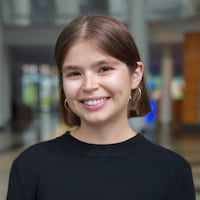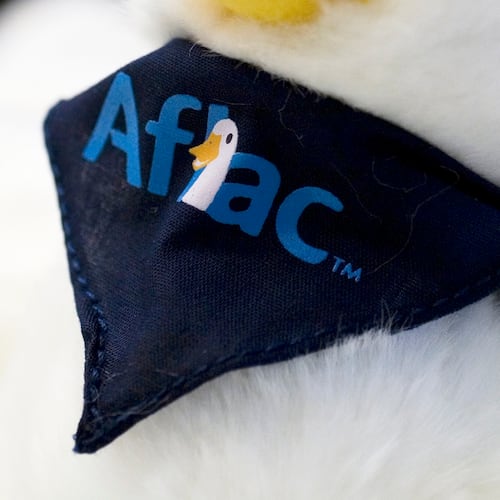In an unassuming corner of Ponce City Market sits a nearly-empty storefront with a wood-framed pavilion at its center.
Unlike its neighbors selling shoes, salads and stationery, nothing in this storefront is for sale. Inside are eight spherical devices called “orbs” designed to scan the irises of any curious and consenting visitor. The purpose? To build a global system differentiating humans from bots in the age of rapidly advancing artificial intelligence models.
Opening its doors Tuesday is one of six U.S. flagship locations of World, an identity and financial network built by Tools for Humanity, a startup cofounded by OpenAI CEO Sam Altman. The orbs, slightly larger than the size of a motorcycle helmet, are the physical component necessary to build out a program called “World ID” — a digital passport of sorts that allows users to prove their humanness online without revealing their identity.
Though World has come under scrutiny in multiple countries for privacy concerns, the company said has said in its consent form that its biometric data is handled with “extra security and care.”
Here’s how it works: Visitors enter the store and download the World app to their phone and create an account. They position themselves in front of one of the orbs and scan a QR code through the app. The orb will then take several images of their irises and face, some in visible light, some in infrared, and analyze them. The orb will encrypt the images, send them back to the user’s phone and delete the images. The orb will then create a unique code based on information derived from the iris. This is the basis for the user’s World ID.
Perhaps it’s easier to think about the technology used in the real world. Someone’s World ID can be used to verify their humanness before buying concert tickets online, creating a dating profile or playing online video games. World has already struck partnerships with dating app conglomerate Match Group to verify the identities of Tinder users in Japan, and Razer, a gaming company, to recognize human gamers and eliminate unauthorized, third-party bots.
Adrian Ludwig, Tools for Humanity’s chief architect, told The Atlanta Journal-Constitution humans want real connections with real people.
“World ID is one way that we can help make that easier,” he said.
The goal, in a way, seems to undo some of the potential negative ramifications of OpenAI, Altman’s other company. OpenAI is a leading organization in the rapid adoption of artificial intelligence tools, which are often criticized for their ability to generate fake content that nefarious actors can leverage to their advantage. ChatGPT and text-to-video generator Sora are among the models launched by OpenAI.
The Atlanta location of World is not a pop-up. It’s a full-time, flagship location with no impending closure date. Nashville, Miami, San Francisco, Austin and Los Angeles are the other cities with World locations. The company selected Atlanta, as well as the other locations, because of its status as a tech hub, Ludwig said.
“All of these are places we think of as active, tech-centric, tech-forward,” Ludwig said. “A lot of innovation is happening there.”
Credit: arvin.temkar@ajc.com
Credit: arvin.temkar@ajc.com
Within the next several weeks to months, other locations will launch, Ludwig said. There are more than 1,500 orbs in circulation around the globe, and the company aims to have 7,500 over the next 12 months. Not all of them will be housed in flagship locations — the company is in conversations with retailers to put Orbs in them, too. As of Tuesday morning, 26.6 million people around the globe have created World IDs, according to a counter on the World app.
The company also has a cryptocurrency component. It was founded in 2019 initially as “Worldcoin,” which is still the name of its token. In exchange for having images of their iris captured, visitors to the World storefront can opt in to receive tokens of WLD, its cryptocurrency, valued at about $1.25 as of Monday night. This incentivizes users to sign up for a World ID.
“We’re building an identity network that can be used by any application provider,” Ludwig said. “There are actually a lot of identity solutions that are not very successful because they’re not able to get up to scale.”
The U.S. launch follows the Trump administration’s support for cryptocurrency and digital assets to drive economic growth. President Donald Trump has promised to make the United States the “crypto capital of the world,” and has said he is open-minded to crypto companies. During the Biden administration, World rolled out its Orbs in other countries, including Portugal and Kenya.
World‘s efforts are not without scrutiny or concerns over privacy and security. A number of countries have launched investigations into the company, including France, South Korea and the United Kingdom. Kenya was one of the first countries in which World began enrollments; its high court recently ordered World to delete local users’ biometric data, ruling it violated privacy rights.
In a 2021 post on the social media platform then known as Twitter, global surveillance whistleblower Edward Snowden warned about cataloging eyeballs and using biometrics for any purpose.
But the images captured by the orb are encrypted, Ludwig said, ensuring the company itself and third-party actors can’t view or access the information. The images never leave the user’s device, Ludwig said.
About the Author
Keep Reading
The Latest
Featured


